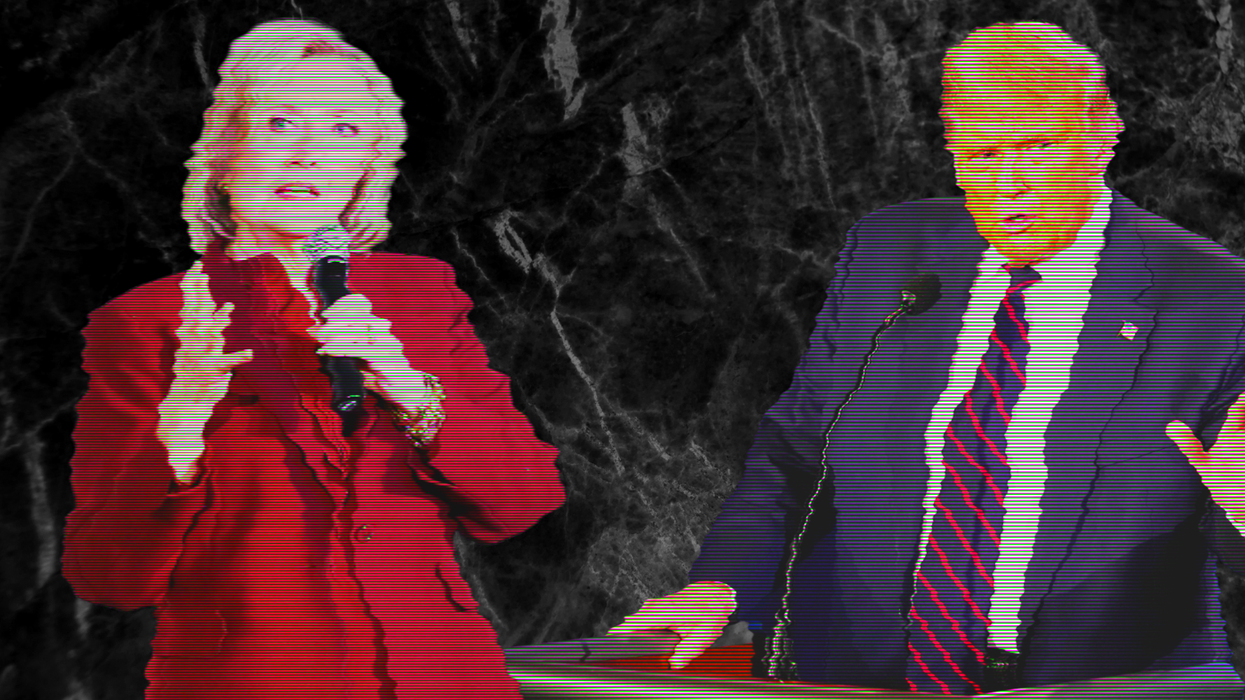News
Sirena Bergman
Sep 30, 2020
For many women, last night’s presidential debate was yet another lesson in how the smashing of the patriarchy is not a linear process.
Despite the hope instilled in us by Hillary Clinton’s presidential run in 2016, and the wave of women elected to Congress in the 2018 Midterms, last night offered a stark visual reminder that even in the futuristic sounding 2020, it’s still two white men in their 70s who – despite both facing accusations of sexual assault – are fighting it out to be president.
Sigh.
In the face of such a horrifying turn of events, many feminists found solace in a quip which has – in a number of variants – become ubiquitous overnight across social media feeds.
“Clearly, men are too emotional for politics,” they read sarcastically. Or: “Don’t ever tell me women are too emotional to be president again.”
The implication is clear and the simplicity of the point appealing: after centuries of being painted as “irrational”, “hysterical” or “too sensitive”, women continue to be underrepresented in politics, while the two dudes taking up the space put on an outrageous show of histrionics on live TV because they, as privileged men, can get away with it.
It is understandably frustrating. But it’s also a wildly unhelpful take.
Firstly, it amplifies the idea that emotion is somehow an undesirable quality in a world leader. But more importantly, it simplifies the complex system of sexism which locks women out of positions of power.
The stereotype of women being “emotional” is also more complicated than it may seem.
Take Hillary Clinton. During decades of widespread scrutiny following her husband’s presidency and subsequent scandal, she was continuously criticised for not conforming to perceived norms of femininity. Yet, in the 2008 Democratic primaries, she faced further criticism for deigning to show emotion, with people labelling her impassioned speeches as a sign of “weakness” and of her “unravelling”.
Eight years later Trump took this double standard even further, attempting to categorise her as “crazy” for having emotions. So it’s not hard to assume that she would have been advised to keep all expression of feeling at bay during the campaign.
The lesson Clinton will have been taught by her advisors, and the one fuelling the comments about last night’s debate, is this: emotions are endearing when you’re viewed first and foremost as as a wife and mother, but detrimental if you want to be president.
And yet, when you look back at the criticism levelled against Clinton in 2016, it seems clear that things are not as cut-and-dry as they seem.
She was criticised for coming off too cold, unempathetic and lacking in humanity.
In fact, it was in her powerful concession speech after Trump’s win that led many to see her as relatable for the first time, with people even suggesting that had she expressed the same level of passion during the campaign, she could have won.
"Winning," you say? As a woman, I don't know her. It's lose-lose, no matter which way you play it.
We see an almost identical narrative across the Atlantic when looking at reactions to Theresa May’s leadership.
So harshly was she criticised for being robotic (“Maybot” became a common cruel moniker for the then-prime minister) that she was forced into self-humiliation in her infamous dancing “bit”. The endless mocking for her Dancing Queen moment was perhaps seen as a welcome respite from non-stop accusations of having no feelings. Even her own colleague Andrea Leadsom tried to suggest that May’s lack of conforming to standards of womanhood by not having children somehow made her a less worthy leader.
Much like in Clinton’s case, it was only when she was handing over power that she allowed herself to show true emotion, and once again, she was criticised for not doing so sooner.
It’s almost as if when it comes to being in positions of power, no matter how we behave, women will always be subject to impossible standards.
Emotional = irrational, unfit for the job; unemotional = cold and unfeeling, unfit for the job.
And that’s exactly why simplifying the issue is a problem.
From birth, society instils in us a subconscious acceptance of male supremacy and of what womanhood looks like. Women should be caring and empathetic, we’re told, their value lying in how they look and whether or not they bear children. Meanwhile men are constantly portrayed as strong, rational and powerful. They are not asked how they balance their work and family life, or what their favourite cookie recipe is.
The outcome of these biases show themselves over and over again – in young girls being encouraged to move away from studying maths and sciences, in female entrepreneurs and all-female teams receiving less than 1 per cent of venture capital funding in the UK, in women consistently underestimating their ability to do a job (and therefore being less likely to apply), while men overestimate their own.
The “emotional issue” is just one example of systemic gender inequality which keeps women out of positions of power. And it’s not really the one we should be focussing on.
Criticising Trump and – to a lesser extent – Biden for showing emotions does a disservice to us all. It perpetuates the idea that someone’s outward display of feelings is in any way related to their ability to do their job as president. It also implies that being driven, to some extent, by empathy and emotion is a negative trait.
It’s Trump’s complete lack of empathy which makes him a terrifying president, especially when contrasted with the world leader most perhaps known for their empathy, Jacinda Ardern, whose unique sensitivity, expressed alongside a strong reliance on science, has been credited with New Zealand’s excellent response to the Covid-19 pandemic.
While a flippant tweet can make for a fun switch-up of sexist tropes, in this case its ubiquity betrays a worrying buy-in to the stereotypes we should be trying to break down, and suggests a far too simple perception of why society continues to stop women rising to the top.
There are myriad reasons why the two men sharing the stage last night were a disgrace to us all and a blatant example of men failing upwards while women are dismissed. But whether or nor they were “emotional” is not one of them.
Top 100
The Conversation (0)














